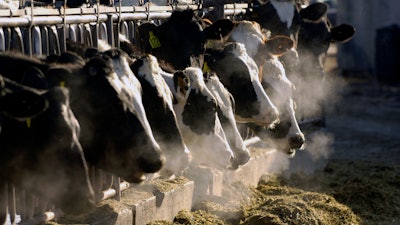
BOISE, Idaho (AP) — The University of Idaho wants to build the nation’s largest research dairy and experimental farm in south-central Idaho, the geographical heart of the sector.
University President Scott Green and school officials in a presentation to Gov. Brad Little and other members of the Idaho Land Board on Tuesday said the proposed Center for Agriculture, Food and the Environment, or CAFE, will help support growth of the dairy and other industries.
“CAFE will be a leader (for) water usage and environmental quality challenges while supporting the continued growth of the dairy, livestock, cropland and food processing industries,” Green told the board.
The dairy industry is Idaho’s top agricultural sector and ranks third in the nation behind California and Wisconsin. Idaho's main dairy products are milk, cheese and yogurt.
The school wants the Land Board to use $23 million from the 2021 sale of 282 acres (114 hectares), in Caldwell, of endowment land benefitting the University of Idaho's College of Agriculture and Life Sciences to buy roughly 640 acres (259 hectares) of farmland in Minidoka County north of Rupert. The $23 million is in a fund controlled by the Land Board.
The presentation on Tuesday was informational and the board is expected to take action on the plan in September.
If the board approves the request, and everything advances as envisioned by the university, the dairy and farm would be fully operating by 2026.
University officials provided a detailed roadmap of the plan under review by the Idaho Department of Lands, which the Land Board directs. The next step is for the plan to be reviewed by the board's investment subcommittee and. If approved, the plan would return to the Land Board in September for a possible decision.
The operation would include an experimental farm and 2,000-cow research dairy in Minidoka County. Classrooms, labs and faculty offices would be constructed in Jerome County near where Interstate 84 and U.S. Route 93 intersect. A food processing pilot plant with a workforce training and education facility would be located at the College of Southern Idaho campus in Twin Falls County.
The issue before the Land Board only involves the experimental farm and research dairy.
The university's proposed site for the research dairy is in the midst of the state's dairy industry. Besides benefitting the dairy industry, school officials also called the plan a critical advancement for the Washington-Idaho-Montana-Utah Regional Program that serves students pursuing veterinary careers.
“Our students will benefit by having access to a world-class facility,” Green said. “Students will gain hands-on experience working with the latest agricultural technologies, and Idaho industry will gain access to the latest advancements and research.”
The university with its own money has already purchased about half of the 640 acres (250 hectares), and the Idaho Dairymen's Association purchased the other half.
The association plans to donate it to the university after the Land Board approves the university's plan. The land overall is valued at about $6 million.
The $23 million the university is seeking would be used to buy the land and make it endowment land. The remaining money could be used for buildings and site improvements, such as grading and nutrient management lagoons.
Endowment land is land Idaho received at statehood from the federal government to generate money for various institutions, mainly public education. The endowment land is divided among the beneficiaries and one of them is the University of Idaho's Agricultural College.
The overall cost of the dairy and farm, including cows, machinery and infrastructure, is about $50 million. The remaining $27 million not covered by the $23 million request to the Land Board would come from various sources, including $10 million from the state, a potential $6 million from the U.S. Agricultural Research Services, the Agricultural College and donations.
The dairy industry faces challenges on numerous fronts, including what to do with dairy farm waste and reducing greenhouse gas emissions. The research dairy could develop ways to create byproducts to deal with those problems, school officials said.
"The dairy industry nationwide has set a goal of reaching net-zero greenhouse emissions by 2050," Brent Olmstead, assistant dean for the Agricultural College, told the board. “The dairy industry has no idea how to do that at present. CAFE will provide an opportunity for research to get Idaho's dairy families to a point where they can reach that goal.”






















